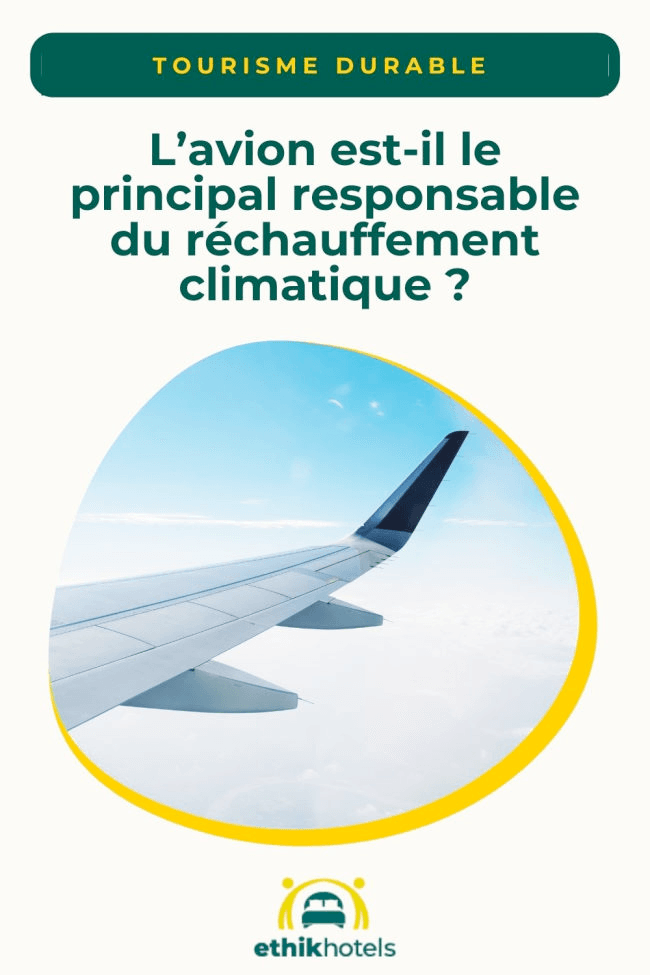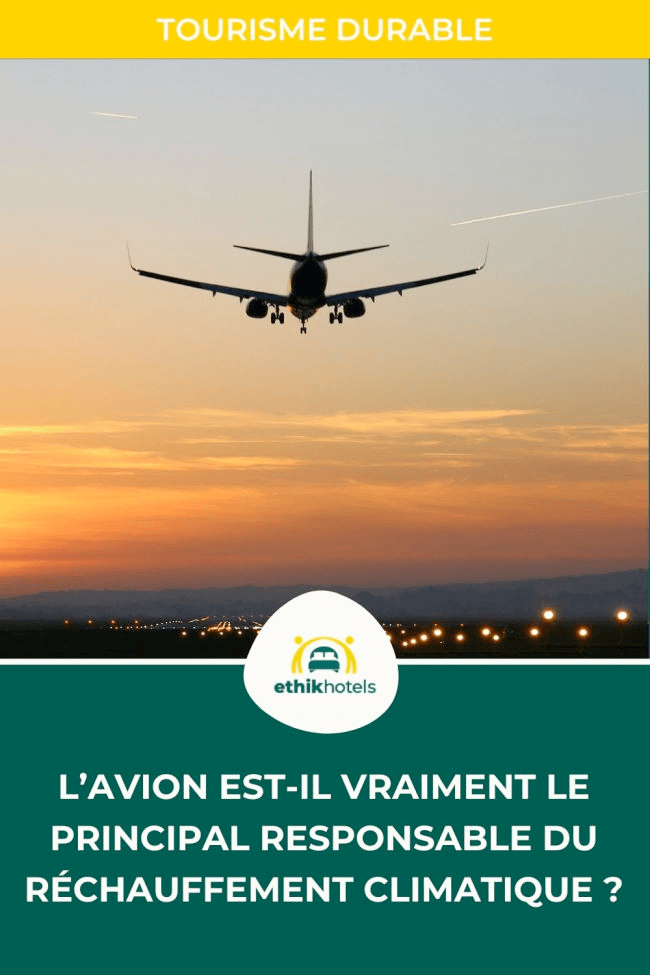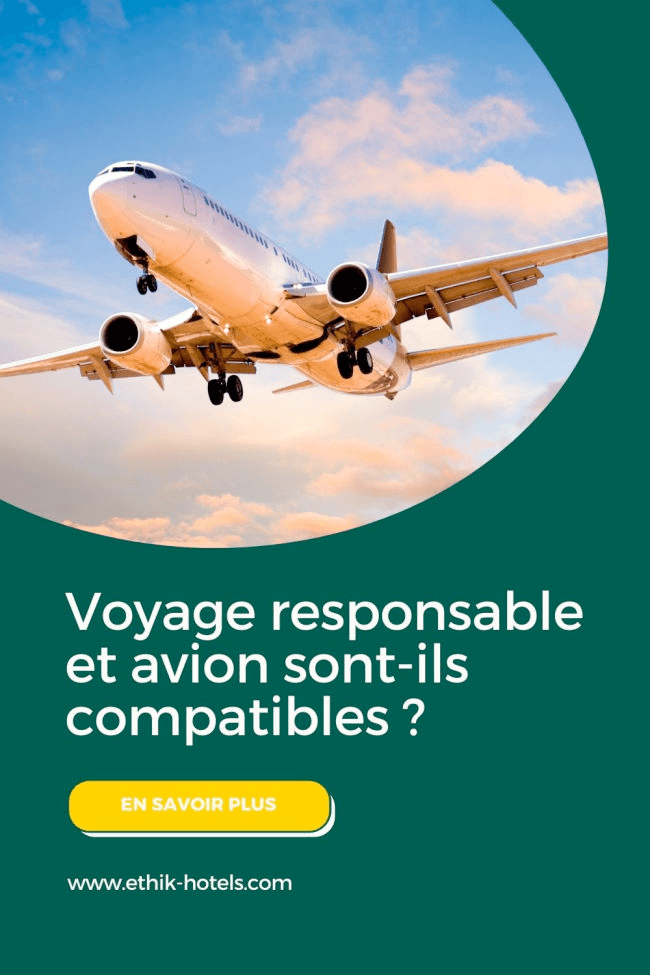This idea of article, on the ecological impact of the plane, I had it as of the launching of Ethik Hotels, since then I listed enormously of articles to have it documented. At the end of November, I have to admit that the draft article has not moved one iota because I absolutely can not find the angle of approach. While talking with Coletta Trivero, whom I had the chance to meet virtually when she was in charge of the communication of Fleurs de Lune, she told me that she was interested in writing such an article and that if I agreed she would be willing to start writing it. How can I say no to this kind of proposal when I haven't put a single word on paper about it for 8 months, even though I have a lot of ideas in mind? I sincerely thank her for this work and for having succeeded in transcribing this factually and without judgment.
Update 10 February 2021
I want to travel! I must travel!
It is with this injunction to travel that I decide to start my article in this period of international pandemic. If, like me, the confinement has been a painful ordeal of immobility, the desire to travel has certainly tugged at you.
So I invite you to take a moment to daydream while reading me, here and now:
Imagine yourself on board a plane. You are sipping a coffee, plugging in your headphones and relaxing. Through the window, you watch with relief as your daily routine slowly fades away... until it becomes invisible. You are comfortably seated and you feel the excitement of the adventure rising inside you. The excitement of discovering a distant destination, where other landscapes, other sounds and other flavors populate a new reality!
What a sweet madness to think about this today.
Madness, because the pandemic is not behind us and my next trip to South America will still have to wait.
Madness, because it is no longer time to be carefree; Greta Thunberg is the living proof. Traveling also means having a negative impact on the environment. Like all generations Y and Z, I am sensitive to this subject. Like you, I was fascinated to see the beneficial effects of confinement on nature. Did you know that between March and June 2020, more than 80% of European air traffic was slowed down, saving 45 Mt of CO2 equivalent emissions? That alone!
As for the ecological activism movements, such as PlaneBashing, #Flygskam, #Flightshame, which were brought to light by the young Swedish activist in 2019, claim that NO, definitely NO, Plane and Ecological Responsibility cannot go together.
Except I don't want to give up my trip and the discovery of South America. I will take that plane! So do I have no choice but to travel with the weight of guilt?
Guilt only attaches to the one who remains ignorant when he has a chance to learn."
Frank Herbert (1)
So I invite you, through this article, to give us the chance to learn how to use air travel responsibly, without demonizing it.
We take 2 minutes to relativize the ecological impact of the plane?
The ecological impact of air travel is undeniable. But if we want to put it into perspective, only 3.5% of the emissions from transport come from this sector.
The digital sector is at 5% ... for the moment ... However, nobody will cry cynicism if I recommend you to watch the documentary COWSPIRACY on Netflix, right?
As for road transport, it contributes to 95% of transport emissions. So if you want to have a real impact on the environment, it's better to consume locally or to favour short circuits and leave your car in the garage.

Another responsible action to adopt: stop buying disposable clothes! 60% of our clothes go to the trash anyway in the first year after their purchase. Dismaying, isn't it?
Fast fashion and the manufacturing industry in general pollute even more than transportation and participate in the particularly inhuman exploitation of a large number of poor workers, far, far away from our eyes.
I let you read this edifying article found on Natura-Sciences.com: "Fast fashion ruins the planet (Infographic)
So why so much relentlessness on aviation?
Because environmental activists are looking for a strong and visible symbol to convey their message.
#Avihonte #Flightshame #Flygskam are movements that stigmatize the plane to excess and perhaps in a slightly fanatical way. But can we blame them for doing effective communication?
On the one hand, this media stigmatization allows to reach the public opinion and forces the airlines and our politicians to make more efforts in the ecological transition of the transport sector.
On the other hand, not taking the plane is finally one of the rare causes of climate change that a citizen can control.
Did you know that one third of CO2 emissions come from the production of gas, steam and electricity? This means that from your home, without wanting to, just by heating, lighting, taking a shower or running the bottle warmer, you pollute in a major way!
In reality, an average citizen has no way to act significantly on this pollution.
So we can indeed stop taking the plane, but I'll tell you right now: it will be a drop of good conscience in an ocean of ecological problems.
I propose here a less radical solution which has already proved its worth in Sweden: a thoughtful consumption of transport...
We adopt responsible travel habits
Thou shalt ban domestic flights!
In the third quarter of 2019, Sweden saw an 8.9% drop in domestic flight traffic (we owe this drop in traffic to the successful communication of the aforementioned environmental activists, by the way); over the same period, the national railway company Statens Järnvägar recorded +15% more passengers.
Why is it a good idea to prefer trains to planes for domestic travel?
Let's illustrate this with an example of a trip: Paris - Toulouse. Here is what your CO2 equivalent expenses would be according to the chosen means of transportation:
By car: 134.6 Kg of CO2 if you are alone
By plane : 80,4 Kg of CO2
By train: 2.6 Kg of CO2 only.
Measuring your CO2 equivalent expenditure is not easy and you will never get the same figures twice. Indeed, in order for your measurements to be accurate, you must take into account several data such as the fill rate, the type of vehicle considered (model, new vehicle or existing fleet), etc. By clicking this link, you will find more details on the calculation methods and websites where you can find information.
However, concerning this occupancy rate, there are some points to be clarified in relation to the statistics used for the car and the plane which really prevent realistic comparisons (more details in this article):
For the car. The reports of the European Environment Agency estimate, for an average car, emissions of 55 g of CO2/passenger/km and 4 passengers. The reality is quite different. The occupancy rate of a car is 1.1 for short journeys and 2.2 for long journeys.
For the plane it is the opposite! The average emission estimate is 285 g of CO2/passenger/km and we consider 88 passengers. Except that in reality, according to Air France, the average occupancy rate of a plane is 85%. The smallest Air France plane for long and medium haul flights has a capacity of 130 seats or 111 passengers on average.
As for the travel time, I can already hear some of my friends explaining to me that the train is too long... Here again, let's put it into perspective: the train takes you from one city center to another. You don't have an airport shuttle or a cab ride to add to your program and you don't have to show up 1 hour before departure. As a bonus, you'll have a little more time on your trip to sleep, read or work. In addition to the good ecological conscience, I think it's a nice compromise.
If you are French and a bit of a complainer (did I just say the same thing twice?!?), you'll tell me that the SNCF doesn't keep its commitments in terms of schedules and frequency. It's not wrong...but it's less true for long distance trains and then the competition arrives in force. So don't be so quick to dismiss your ecological intentions.
To go further, discover our guide to choosing your transportation and reducing your carbon footprint.
Thou shalt optimize business travel!
Before COVID, business travel alone accounted for about 30% of all flights.
Fortunately, the health crisis has highlighted the fact that many meetings are not necessary in person. Collaborative messaging, telephone and teleconferences do the job very well!
Of course, nothing beats human contact and a real face-to-face meeting. Our body language, our body communication, contribute enormously to the quality of an interaction. If you've done a job interview recently, I think you know what I'm talking about. Our empathic capacity is not the same behind a screen. Can you imagine announcing a layoff on Zoom, for example? No, of course not; that would be cold and inhumane. However, let's be reasonable and organized enough to determine which business actions can't be done without face-to-face and which other tasks can be handled virtually.
Finally, if business requires you to do so, then to limit the ecological impact of the airplane in your travels: "Think about flying light - go to the bathroom before departure and avoid heavy luggage -, favor direct flights rather than flights with stopovers because they are 50% more polluting on the same trip".
Let's also use business travel management tools that help limit your environmental impact; I'm thinking of TravelPerk, which offers the possibility of offsetting 100% of your travel-related carbon emissions.
Who you give money to, you choose!
Again, these are healthy consumer habits. It is important to get information and choose your service providers according to your priorities. The index of the least polluting airlines made by the German NGO Atmosfair will certainly help you. Click on the image to discover it.
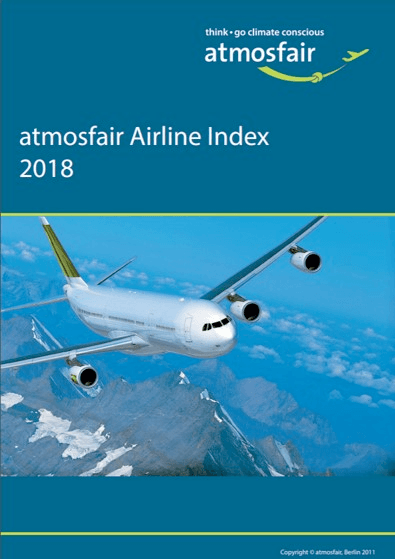
Cock-a-doodle-doo! You will see that the French company Transavia.com is one of the good students.
It has indeed managed to save up to 10% of fuel on its entire fleet. This saving has been achieved thanks to the start-up SAFETY LINE, whose work consists in optimizing the pilots' behaviour, especially during the take-off phase, which is very energy consuming. Thanks to the judicious use of data collected on the aircraft (Big Data), combined with local weather conditions, Safety Line's predictions significantly improve the carbon footprint of your trip.
Air France is among the poor performers in the Atmosfair index, where it is ranked 73rd. However, since 2019, the company offers its customers the possibility of offsetting the CO2 emissions linked to their travel. This option is offered when purchasing a ticket under the heading "Plant a tree".
To learn more about carbon offsetting your vacation
By carefully choosing your transport suppliers, you are setting the direction of the market, you are giving it a trend. The companies that will survive will be those that integrate these new trends into their business model and allow us to limit the ecological impact of air travel. We can take advantage of this major economic crisis to encourage the sector, which has been heavily hit, to move more quickly towards the ecological transition.
If there is one sector that can be transformed, it is the airline industry!
Aviation industries and airlines are a remarkable breeding ground for high-level engineers, researchers and scientists, most of whom are passionate about their work!
If there is one sector that has the means to transform itself, it is this one.
Innovation itself is the reason for aviation's existence. When you think that in one century, we have gone from the Wright brothers' plane in 1903 to the A380 in the 2000s: it's just remarkable!
Why not remain optimistic about the ability of the aviation industry to renew and innovate, again and again?
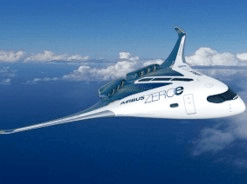
Especially since considerable progress has already been made to reduce the ecological impact of the aircraft. It is important to appreciate this:
Over the last 70 years, CO2 emissions per passenger have decreased by 80%. As we have seen above, air travel represents only 3.5% of the CO2 equivalent emissions caused by transport.
Manufacturers have launched major research and development programs to achieve energy efficiency (batteries, hydrogen, synthetic kerosene, etc.).
Airbus has announced a hydrogen powered commercial aircraft for 2035! In just 14 years. This is not a fanciful projection when you know that in the United States, Zeroavia has already flown a 6-seater hydrogen aircraft!
Boeing announces planes that would run on 100% "sustainable" fuel for 2030
The airline KLM has announced that in January 2021 it will have made the first commercial flight using sustainable synthetic kerosene. This solution would drastically reduce CO2 emissions by 85% compared to current solutions.
Airbus is planning a kerosene-free flight for the end of 2021.
In the meantime, the responsibility of consumers and airlines would be to include in the price of tickets both the carbon compensation and the taxation of jet fuel. Let's forget about the €60 return tickets offered by low cost airlines. They are in themselves a scandal in terms of ecological morality and do not contribute positively to the financial needs of R&D.
It is at this price that we will be able to maintain the air activity in our lifestyle and accompany its transformation.
I will end this article by explaining why I am so keen to defend the survival of the airline industry.
Because when we only discuss the ecological impact of the airplane, we forget that it is the result of one of humanity's wildest dreams. The dream of flying!
Being critical of the current functioning of commercial aviation should not prevent us from considering the emotional, cultural, historical and spiritual dimension of travel.
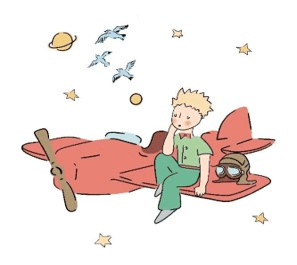
Between economic protectionism, Brexit and pandemic...we seem to be living in a time where withdrawal is gaining ground.
We should no longer see travel as a leisure activity like any other, but rather as a necessary breath of newfound freedom and encounters.
My next trip will be an effort to uproot myself, to actively distance myself from my environment, from my culture. A momentary way to get away from myself, from my habits, from my conditioning, which fix me in a narrow reality (²).
In short and less lyrically, with reading, I see in travel a way to work on opening my mind.
I share with you, my resolutions for the year 2021:
As a global citizen I will be mindful of the impact of all my activities on the environment:
I will no longer consume Fast Fashion
I will only change my smart phone if it breaks
I will install a wood stove at home
I will limit streaming in favor of reading
I will ride my bike as often as possible.
I will take the plane if other means of transportation cannot replace it efficiently and by accepting to pay the right price.
I will not give up the desire to travel! The maturity of my soul depends on it, because as Henri Miller, a travel writer I particularly like, said:
"A destination is never a place, but a new way of seeing things" ....
Henri Miller
To go further in limiting the impact of your vacation, check out our article on zero waste vacation.
Thank you Coletta Trivero for this article that makes us aware of the real ecological impact of the plane in our lives.
Sources:
https://youmatter.world/fr/avion-pollution-voiture-comparaison/
https://www.atmosfair.de/wp-content/uploads/aai2018-englischfarbe_final_mn.pdf
https://fr.wikipedia.org/wiki/Histoire_de_l%27aviation
https://gallica.bnf.fr/blog/14092018/les-femmes-pionnieres-de-la-conquete-de-lair?mode=desktop
https://www.terraeco.net/Train-ou-avion-qui-pollue-le-moins,9794.html
(1) Franck Herbert, la Mort Blanche, 1982 (for lovers of other forms of travel?)
(²) Paragraph directly inspired by an excerpt from "Little praise for wandering" by Akira MIZUBAYASHI.here is a clear and easy to understand comparison of means of transport, you can consult the Ademe website here.
